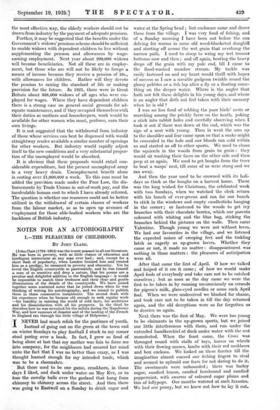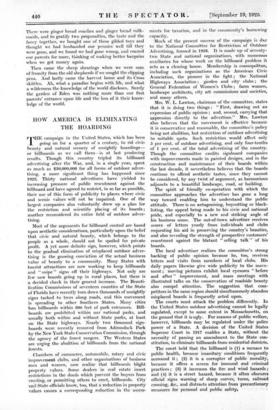NOTES FOR AN AUTOBIOGRAPHY
I.—THE PLEASURES OF CHILDHOOD.
BY JOHN CLARE.
[John Clare (1793-1864) was the truest peasant in all our literature. He was born in poverty, with as little chance of education and intelligent intercourse as any man ever had ; and, except for a short flash of popularity, when London lionized him and treated him as a prodigy, he remained in poverty and obscurity. Yet he loved the English countryside so passionately, and he was himself a man of so sensitive and deep a nature, that his poems are a peculiar and delightful addition to the English language : it would be impossible to match their freshness and their clear and feriae illumination of the details of the countryside. We have joined together some scattered notes that he jotted down when he was thinking of writing his autobiography, and we intend to publish them in three consecutive instalments. The second deals with his experience when he became old enough to seek regular work his timidity in entering the world of cold facts, his ambitions and his dissatisfaction with all his prospects. In the third he describes how he was recruited fo'r the militia during the Napoleonic War, and how rumours of disaster and of the landing of the French in England ran through the little village of Helpstone.1 I NEVER had much relish for the pastimes of youth. Instead of going out on the green at the town end on winter Sundays to play football I stuck to my corner stool poring over a book. In fact, I grew so fond of being alone at last that my mother was fain to force me into company, for the neighbours had assured her mind unto the fact that I was no better than crazy, as I was thought learned enough for my intended trade, which was to be a shoemaker.
But there used to be one game, crookhorn, in those days I liked, and duck under water on May Eve, or to toss the cowslip balls over the garland that hung from chimney to chimney across the street. And then there was going to Eastwell on a Sunday to drink sugar and water at the Spring head ; but enclosure came and drove these from the village. I was very fond of fishing, and of a Sunday morning I have been out before the sun delving for worms in some old weed-blanketed dunghill and starting off across the wet grain that overhung the narrow path. I used to stoop to wring my wet trouser bottoms now and then ; and off again, beating the heavy drops off the grain with my pole end, till I came to the flood-washed meadow stream. My tackle was easily fastened on and my heart would thrill with hopes of success as I saw a sizeable gudgeon twinkle round the glossy pebbles or a fish lap after a fly or a floating some- thing on the deeper water. Where is the angler that bath not felt these delights in his young days, and where is an angler that doth not feel taken with their memory when he is old ?
I was no less fond of robbing the poor birds' nests or searching among the prickly furze on the heath, poking a stick into rabbit holes and carefully observing when I took it out if there was down at the end, which was the sign of a nest with young. Then in went the arm up to the shoulder and fear came upon us that a snake might be concealed in the hole and our bloods ran cold within us and started us off to other sports. We used to chase the squirrels in the woods from grain to grain : they would sit washing their faces on the other side and then peep at us again. We used to get boughs from the trees to beat a wasps' nest, till some of us were stung and we ran away.
And then the year used to be crowned with its holi- days as thick as the boughs on a harvest home. There was the long wished for Christmas, the celebrated week with two Sundays, when we watched the clerk return with his bunch of ever-greens and ran for our bunch to stick in the windows and empty candlesticks hanging in the corner ; or hastened to the woods to get ivy branches with their chocolate berries, which our parents coloured with whiting and the blue bag, sticking the branches behind the pictures on the walls. Then came Valentine. Though young we were not without loves. We had our favourites in the village, and we listened the expected noises of creeping feet and the tinkling latch as eagerly as up-grown lovers. Whether they came or not, it made no matter : disappointment was nothi g in those matters : the pleasures of anticipation were all.
After that came the first of April. 0 how we talked and hoiped of it ere it came ; of how we would make April fools of everybody and take care not to be catched ourselves ; but as soon as the day came we were the first to be taken in by running unconsciously on errands for pigeon's milk, glass-eyed needles or some such April fool. When we were undeceived we blushed for shame, and took care not to be taken in till the day returned again, and the old deceptions were so far forgotten as to deceive us again.
Next there was the first of May. We were too young to be claimants in the up-grown sports, but we joined our little interferences with them, and run under the extended handkerchief at duck under water with the rest unmolested. When the feast came, the Cross was thronged round with stalls of toys, horses on wheels with their flowing manes, lambs with their red necklaces and box cuckoos. We looked on these fineries till the imagination almost coaxed our itching fingers to steal and seemed to upbraid our fears for not daring to do it. The sweetmeats were unbounded ; there was barley sugar, candied lemon, candied horehound and candied peppermint, with swarms of coloured sugar plums and tins of lollypops. Our mouths watered at such luxuries. We had our penny, but we knew not how to lay it out. There were ginger bread coaches and ginger bread milk- Maids, and to gratify two propensities, the taste and the fancy together, we bought one of these gilded toys and thought We had husbanded our pennies well till they were gone, and we found we had gone wrong, and coaxed our parents for more, thinking of making better bargains when we got money again.
Then came the sheep shearings when we were sure of frumity from the old shepherds if we sought the clipping pens. And lastly came the harvest home and its Cross skittles. Ah, what a paradise begins with life, and what a wilderness the knowledge of the world discloses. Surely the garden of Eden was nothing more- than. our first parents' entrance upon life and the loss of it their know- ledge of the world.











































 Previous page
Previous page